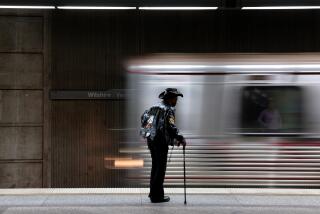Gorbachev Takes Control of Soviet Law Enforcement
- Share via
MOSCOW — Mikhail S. Gorbachev on Tuesday placed all law enforcement activities under his direct control, apparently including troops assigned to begin patrolling Soviet streets alongside regular police officers.
Gorbachev appointed Yuri Golik, chairman of a legislative committee on law and crime control, to head the presidential commission on law enforcement.
Two senior military leaders, meanwhile, said the troops that will begin patrolling Soviet streets Friday will not use armored personnel carriers in their routine work. They also said the republics will have a say in how the troops are deployed.
The joint patrols were ordered Dec. 29 by Interior Minister Boris K. Pugo and Defense Minister Dmitri T. Yazov but were disclosed only last week. Government officials have denied that putting the military on street patrol amounts to a crackdown on restive republics seeking independence from the Kremlin.
Maj. Gen. Viktor Solomatin, head of the general staff of the Soviet Armed Forces Department, said in an interview published Tuesday that the military patrols were established solely to fight the surging crime rate in the Soviet Union.
By establishing a presidential body to coordinate law enforcement, Gorbachev appears to be putting his stamp of approval on the joint patrols. The move also may prevent the military from taking action without his knowledge.
Gorbachev has insisted that he did not order recent crackdowns in Lithuania and Latvia, although he subsequently endorsed the actions. Thirteen civilians and a soldier were killed in a military assault in Vilnius on Jan. 13, and five others have died in similar attacks in Latvia this month.
Democratic Russia, the Soviet Union’s largest popular opposition group, announced Tuesday that it is planning civil disobedience measures to resist the order authorizing joint military and police patrols.
“We are talking about demonstrations, pickets and even the symbolic guarding of certain key newspapers,” said Leonid Batkin, a cultural historian and a leader of Democratic Russia. “Things have reached such a point that civil disobedience, even strikes, are the only ammunition the democratic forces have.”
More to Read
Sign up for Essential California
The most important California stories and recommendations in your inbox every morning.
You may occasionally receive promotional content from the Los Angeles Times.












